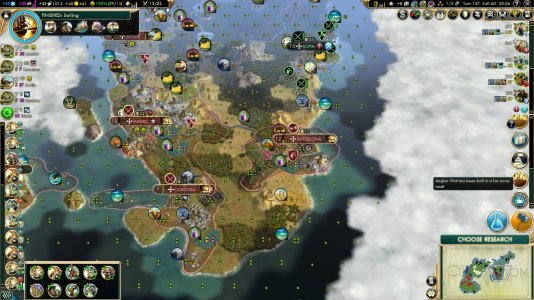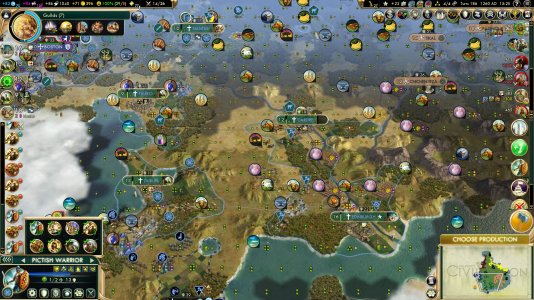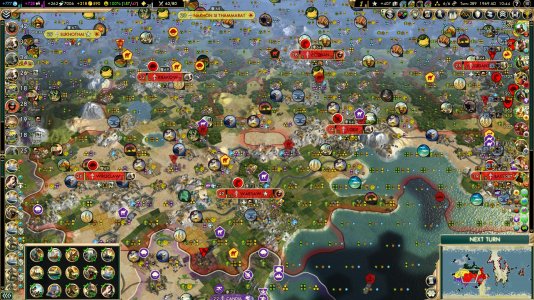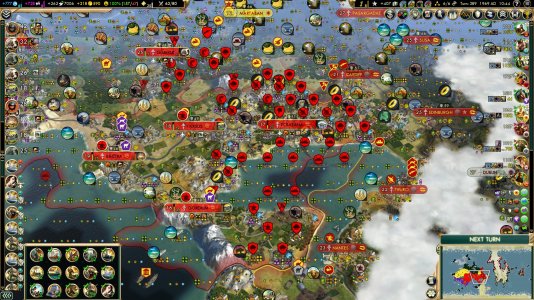Mostly civ specific guides on Steam and a few videos by the channel Milae on youtube.
My main struggle is like as low as difficulty 3 the AIs seem to be leaving me the dirt in terms of everything: Production, gold, culture, sciences; Sometimes if I get a civ like Russia (tend to do random civ) I'll head one thing like Science but everything else they outclass me no matter what;
I really don't know how to describe it other than that. I could maybe record a timelapse of a campaign of mine and throw it up on youtube for you to have a look over if you think it'll help.
While Milae is much more prolific for civ i find Martin Fencka much more representative.
For resources, it is perfectly normal for the AI to outclass you in resources until the mid/late game where you may start to out do them in aspects that are important to your choice of victory. You should just focus on having the resources to do what you want to do. e.g. you can fight an AI with a much smaller military than the AI by using your military better and positioning it well. you generally have enough gold if you can afford to purchase important things and not about to go bankrupt.
Great people are an important tool and are one way the player can catch up/gain an advantage. If your competing for a wonder you really want you can use an engineer to make sure you get it. If you really want to get a tech first you can use a great scientist to rush to it, if you are stuck in a stalemate or tricky position in a war you can expend a great general on a citadel to radically change the power balance of a front line.
Unless your really rushing something it is generally better in the long term to expend great people on their tile improvements or great works until the late game when they should be really powerful to expend for resources and you will ultimately get more resources from expending them rather than using their special ability. As a general rule it is generally best to put a great person improvement on another special resource than try to improve and ordinary or poor tile. One really good tile is better than two ok tiles.
Looking at your screenshots i see very few workers. Early on i usually aim for 1 worker per city and try to make sure all the tiles i am working are improved as well as connecting cities by road as soon as possible which has a number of advantages. Looking at your celts screenshot i see your capital has 16 population yet i can only see 7 improved tiles.
In all the screenshots you always seem to have plenty of gold and GPT, don't be afraid to use it to rush important buildings, buy workers early on, buy units or buy tiles. For example in the spain screenshot i see Barcelona has a population of 12 yet only has 10 workable tiles of which only 6 tiles are improved and the two coast tiles are only neutral as they only produce two food so would simply support the poplulation working them. You had 441 gold and 45gpt with wheat, dyes, fish and iron all in range of the city. If you can buy a tile with a sellable resource you can you can often make the money back you spent on buying the tile(s) by selling the resource if you don't need it and you still have a good tile to work.
Across all the screenshot it looks like your cities are too far apart. While it seems like a waste overlapping cities you will often find you don't end up working many of the tiles in the city radius especially if you work specialists. Your cities seem to have very high polulations in your games which is likely due to low difficulty level and you usually have much lower populations in higher games when happiness in particular is more of an issue. If cities are closer they can share tiles early on which can help newer cities grow until they can claim good tiles of their own, it allows cities to help protect each other better and means you close off your borders sooner to stop the AI from dropping a city in the middle of your territory. If your warring putting a city as close as possible to an enemy city can be a great advantage also as it provides you a great base to attack from with the city potentially adding firepower against enemy units while providing you with home territory so you can heal your units quicker.
If you have the happiness to support it then annexed cities will be much more productive to your empire than puppeted cities and ironically can actually produce less unhappiness.
It is usually a good idea to decide on what victory condition you are going for as early as possible and ultimately aim for that in everything you do. i.e. choice of social policies, what techs to pick first, what to proritise building or rushing in cities, what wonders to aim to get. Most civs are usually focused towards a particular victory type and it is usually easiest to choose a civ based on the victory condition you want to aim for or choose a victory condition based on the bonuses the civ you chose has. You can easily go up or down a difficulty level by choosing the right or wrong civ and victory condition.
Don't ignore city states even if your not playing a diplomatic game. Aim to keep city states nearby as allies if for no other reason than if your enemy makes them their ally and then declares war on you will have to fight the city state also. Looking purely at the bonuses you can get from city states you get nice bonuses just from being friends if you can't make them allies. Sending a diplomatic unit occasionally (which can be purchased with excess gold) and doing any quests you can will keep you friendly with most city states.
Religion can make a huge difference to a game. It can help make friends or enemies. It can be used to make up for some of your weakness or enhance your advantages as it can provide a large amount of resources or utility and is extremly flexible in general. Even if you plan to completely dominate with your religion it is often advantageous to let other religions spread to your cities initially so you can purchase their building before you swap to your religion or if your conquering always check if the city can buy any religious buildings before converting it. Even if you have a religion and have little chance of spreading it far you can aquire other religions buildings while securing your religion at home and if you pick options which don't require you to spread your religion it can still be very strong.
When you meet another civ, check out their civilopedia entry and you can get an idea of how they are going to interact with you. Do you need to build a military as they a war focused civ? Even if their not war focused do they have unique units and when will they arrive and thus be most dangerous militarily? Do they have bonuses toward city state and thus are you going to need to work harder to keep the city states you want? Are they religion focused and thus you are going to have to compete with them religiously etc? Are they going to be going for the same type of victory as you are and likely to be unhappy with you for competeing and maybe do you want to take them out before they become a problem?







